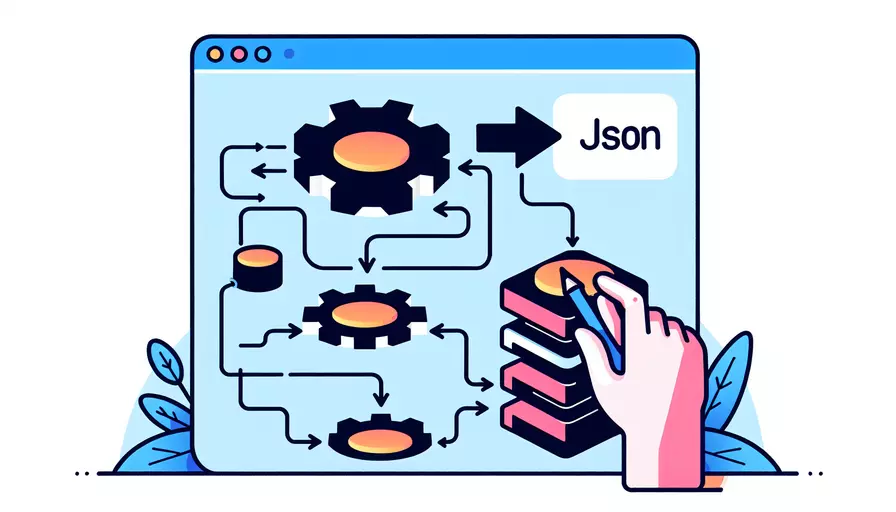
在Vue中传递JSON数据有多种方式,以下是一些常见的方式:1、通过组件的props传递、2、使用Vuex进行状态管理、3、通过事件传递、4、使用axios或fetch等库进行HTTP请求。接下来详细描述每种方法及其实现方式。
一、通过组件的props传递
在Vue中,父组件可以通过props属性向子组件传递数据,包括JSON数据。这种方法简单直接,适用于父子组件之间的数据传递。
-
父组件代码示例:
<template><div>
<child-component :json-data="jsonData"></child-component>
</div>
</template>
<script>
import ChildComponent from './ChildComponent.vue';
export default {
components: {
ChildComponent
},
data() {
return {
jsonData: { name: 'John', age: 30 }
};
}
};
</script>
-
子组件代码示例:
<template><div>
<p>Name: {{ jsonData.name }}</p>
<p>Age: {{ jsonData.age }}</p>
</div>
</template>
<script>
export default {
props: {
jsonData: {
type: Object,
required: true
}
}
};
</script>
二、使用Vuex进行状态管理
Vuex是一个专为Vue.js应用设计的状态管理模式。通过Vuex,可以在不同组件间共享状态,包括JSON数据。
-
安装Vuex:
npm install vuex --save -
定义Vuex store:
import Vue from 'vue';import Vuex from 'vuex';
Vue.use(Vuex);
export default new Vuex.Store({
state: {
jsonData: { name: 'John', age: 30 }
},
mutations: {
setJsonData(state, payload) {
state.jsonData = payload;
}
},
actions: {
updateJsonData({ commit }, payload) {
commit('setJsonData', payload);
}
},
getters: {
jsonData: state => state.jsonData
}
});
-
在组件中使用Vuex数据:
<template><div>
<p>Name: {{ jsonData.name }}</p>
<p>Age: {{ jsonData.age }}</p>
</div>
</template>
<script>
import { mapGetters } from 'vuex';
export default {
computed: {
...mapGetters(['jsonData'])
}
};
</script>
三、通过事件传递
在Vue中,可以使用事件机制在组件间传递数据。父组件通过事件监听子组件的事件,从而接收子组件传递的数据。
-
父组件代码示例:
<template><div>
<child-component @send-json="handleJsonData"></child-component>
</div>
</template>
<script>
import ChildComponent from './ChildComponent.vue';
export default {
components: {
ChildComponent
},
methods: {
handleJsonData(jsonData) {
console.log(jsonData);
}
}
};
</script>
-
子组件代码示例:
<template><div>
<button @click="sendJson">Send JSON</button>
</div>
</template>
<script>
export default {
methods: {
sendJson() {
const jsonData = { name: 'John', age: 30 };
this.$emit('send-json', jsonData);
}
}
};
</script>
四、使用axios或fetch进行HTTP请求
在实际开发中,JSON数据常常需要从服务器获取,这时可以使用axios或fetch等HTTP库进行请求。
-
安装axios:
npm install axios --save -
使用axios请求JSON数据:
<template><div>
<p v-if="jsonData">Name: {{ jsonData.name }}</p>
<p v-if="jsonData">Age: {{ jsonData.age }}</p>
</div>
</template>
<script>
import axios from 'axios';
export default {
data() {
return {
jsonData: null
};
},
created() {
axios.get('https://api.example.com/data')
.then(response => {
this.jsonData = response.data;
})
.catch(error => {
console.error(error);
});
}
};
</script>
总结:在Vue中传递JSON数据的方式多种多样,可以根据具体需求选择适合的方法。通过props传递适用于父子组件间的简单数据传递,Vuex适用于全局状态管理,事件传递适用于自定义事件的场景,axios和fetch则适用于网络请求获取数据。选择合适的方法能够提高开发效率和代码的可维护性。
相关问答FAQs:
如何在Vue中传递JSON数据?
在Vue中,可以通过多种方式传递JSON数据。以下是一些常见的方法:
-
通过props传递JSON数据
在Vue中,可以使用props将JSON数据从父组件传递给子组件。在父组件中,将JSON数据作为props的属性传递给子组件,在子组件中可以通过this.props来访问传递过来的JSON数据。例如,在父组件中:
<template> <child-component :data="jsonData"></child-component> </template> <script> import ChildComponent from './ChildComponent.vue'; export default { data() { return { jsonData: { name: 'John', age: 25, email: 'john@example.com' } } }, components: { ChildComponent } } </script>在子组件中,可以通过props来接收和使用传递过来的JSON数据:
<template> <div> <p>Name: {{ data.name }}</p> <p>Age: {{ data.age }}</p> <p>Email: {{ data.email }}</p> </div> </template> <script> export default { props: { data: { type: Object, required: true } } } </script> -
通过事件传递JSON数据
另一种在Vue中传递JSON数据的方法是通过自定义事件。父组件可以通过$emit方法触发一个自定义事件,并将JSON数据作为事件的参数传递给子组件。子组件可以通过监听这个自定义事件来接收传递过来的JSON数据。例如,在父组件中:
<template> <div> <button @click="sendData">Send Data</button> <child-component @data-received="handleData"></child-component> </div> </template> <script> import ChildComponent from './ChildComponent.vue'; export default { methods: { sendData() { const jsonData = { name: 'John', age: 25, email: 'john@example.com' }; this.$emit('data-received', jsonData); }, handleData(data) { // 处理传递过来的JSON数据 console.log(data); } }, components: { ChildComponent } } </script>在子组件中,监听父组件传递的自定义事件,接收传递过来的JSON数据:
<template> <div> <p>Name: {{ receivedData.name }}</p> <p>Age: {{ receivedData.age }}</p> <p>Email: {{ receivedData.email }}</p> </div> </template> <script> export default { data() { return { receivedData: null } }, created() { this.$parent.$on('data-received', this.handleData); }, methods: { handleData(data) { // 处理传递过来的JSON数据 this.receivedData = data; } } } </script> -
通过Vuex传递JSON数据
如果你在Vue项目中使用了Vuex状态管理库,你可以通过Vuex来传递JSON数据。在Vuex的store中定义一个state来存储JSON数据,在需要使用JSON数据的组件中,可以通过getters来获取这个JSON数据。例如,在Vuex的store中:
// store.js import Vue from 'vue'; import Vuex from 'vuex'; Vue.use(Vuex); const store = new Vuex.Store({ state: { jsonData: { name: 'John', age: 25, email: 'john@example.com' } }, getters: { getJsonData(state) { return state.jsonData; } } }); export default store;在组件中,可以通过使用mapGetters辅助函数来获取Vuex中的JSON数据:
<template> <div> <p>Name: {{ jsonData.name }}</p> <p>Age: {{ jsonData.age }}</p> <p>Email: {{ jsonData.email }}</p> </div> </template> <script> import { mapGetters } from 'vuex'; export default { computed: { ...mapGetters(['getJsonData']), jsonData() { return this.getJsonData; } } } </script>
这些方法都可以在Vue中传递JSON数据。你可以根据你的项目需求选择合适的方法来传递和使用JSON数据。
文章标题:vue如何传递json,发布者:worktile,转载请注明出处:https://worktile.com/kb/p/3664573

 微信扫一扫
微信扫一扫  支付宝扫一扫
支付宝扫一扫 